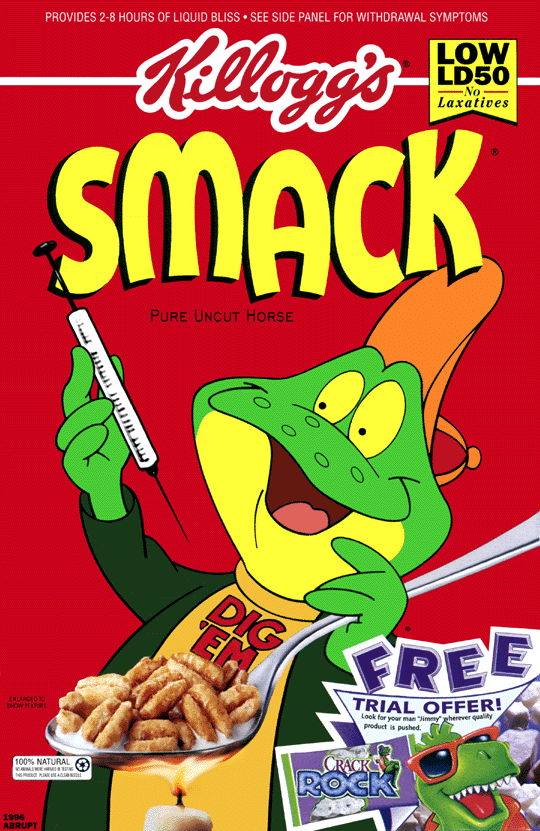abrupt.org is now a legit domain! Please update all links and bookmarks. Also, there’s an alien on the homepage. D’OH!
SMACK
Happy New Year! Check out SMACK. [CULTURE JAMMING]
Smack
Tales of a Shaman’s Apprentice
If you have ever snorted scornfully at concern over the rainforests, this book will wipe the smirk off your face. It is primarily a travelogue, the story of Plotkin’s search for medicinal plants in the Amazon. As an ethnobotanist, he works closely with several indigenous tribes and their shamans. A picture quickly emerges of a world on the brink of vanishing. This is not just the rainforest ecosystem itself, which is one of the richest and most diverse on the planet (a quarter of all plant species grow there, etc.) What Plotkin finds is that the extremely sophisticated biochemical knowledge possessed by the native cultures is being lost at an alarming rate. Rapid Westernization, from the influence of Christian missionaries to an increasing dependence on consumer products, has resulted in a wholesale abandonment of ‘the old ways’. With the perceived superiority of modern medicine to shamanic cures (a superiority the author seriously questions), few young people have interest in training for the role of shaman. The result, states Plotkin, is that “each time one of these medicine men (or women) dies, it is as if a library has gone up in flames.”
Though the book ends on a note of qualified optimism, the reader cannot help but feel ashamed at the short-sighted hubris of our culture in dealing with native peoples. Even in cases where such cultures were not actively suppressed, we have failed to understand that what is quickly disappearing in these remote and mysterious regions is an absolutely vital part of the Human legacy. [New York: Penguin]
Comes the Millennium
Purporting to be “a look at the burgeoning hysteria, religious mania, and anti-intellectualism as the millennium approaches,” this book is actually a polemic against the much narrower threat of the “Christian Right”. The premise is that, due to religious extremists’ apocalyptic worldview, we should be very concerned about our survival past Dec. 31, 1999. Blake, a self-professed “rational person”, takes this threat quite seriously, it seems, though he fails to offer much in the way of actual doomsday scenarios, other than Ronald Reagan starting WWIII. He goes about dissecting and refuting the political and pseudoscientific claims of fundamentalist bigots — claims which are patently absurd to begin with. His critique is meticulous indeed, explaining to us the many reasons why racial diversity, sexuality, homosexuality, secular humanism, and the theory of evolution are valid areas of human activity, instead of the work of Satan. But reading his litany of self-evident arguments I began to wonder, “Why bother?” Rationality is only an antidote for irrationality once its premises have been accepted. It is not the case that irrationality exists only to the degree that reason is absent; they are qualitatively different, not opposites. What Blake does is to engage his somewhat contrived enemy on its own terms, thereby keeping the debate on a level not much higher than the average Geraldo showdown. When I finished the book, I felt that I had just been lectured to by a sophomoric high school student. For a rationalist, Blake is embarrassingly smug, and besides, doesn’t he know the world isn’t going to end until 2012?
First guest dream
Our first guest dream is in CLUESPACE. [LOGOS]
Plane Crash in TV Land
The dream began as I was driving on an access road near the interstate, listening to the radio. I was listening to my favorite morning show, and they were telling of an airplane disaster at the local airstrip — apparently there was an explosion that began with a spark of static electricity, and LOTS of people died (even though it is a tiny airport). Continue reading %s
Asymptote
There is increase today
I see myself fly
past row upon row of ordered neatness
Desert beneath me, papyrus sands beneath me
What day is this, come upon us like the end of words?
The sky shakes like a frightened lamb
While the letters unbroken slide
The whole sky is shaking
and I am so small
A drop in your ocean of sand
There is talk in the village
And rumor in the field
A stranger! A stranger has come
speaking the words of Man
with the voice of lightning
in heavy clouds
Why does the earth tremble like a leaf today?
And how the wilderness heaves!
Is it your wind that blows at last
through the dust and leaves
me scrawling my mark upon the sands?
Oh, one last drop of milk, of sweet water
before we fly
To remember the gentle touch
of rain on hands
and of this tiny love,
before we increase forever
inspired
Junky
The famous semi-fictional documentary of an addict’s universe. Tells of pleasure, pain, craving and curiousity in a matter-of-fact tone which is both chilling and revealing. Written before the cut-up period, the story is clear and straightforward, with no attempt to justify or excuse the problems it uncovers. In an ongoing atmosphere of hysteria over ‘drugs’, this book remains a realistic review of the myths obout use and addiction, from someone who’s actually been there. [New York: Penguin]
Process and Reality
An elucidation of the general metaphysical principles underlying everything. Whitehead attempts a rigorous and consistent system for explaining how novel actuality enters into the world. He seeks to coordinate metaphysics with the revolutions of both quantum physics and relativity theory, while picking and choosing elements from Eighteenth-Century philosophy. The resulting massive tome has at its heart a vision of a universe in constant re-creation of itself, in which each part uniquely reflects the whole. Reading this, I was both humbled before the workings of so great a mind, and inspired by his unifying and, ultimately, optimistic vision of a world both eternal and ever-renewed. [New York: Free Press]

